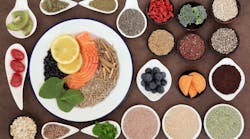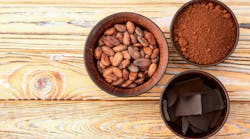Cranberries: A “berry” good choice for oral health?
Dental hygienists are moving care from a patient-centered model to one of person-centered care. In patient-centered care, assessments are based solely on individual visits.1 In contrast, person-centered care involves a broad understanding of individuals based on accumulated knowledge.1
To enhance a person's oral health, health-care providers need to consider a broad range of information about the individual, not just their clinical needs. This approach emphasizes achieving optimal oral health for the person instead of treating them based merely on their immediate care needs. As part of this shift, incorporating natural and sustainable ingredients such as Vaccinium macrocarpon, commonly known as cranberry extract, can be a beneficial component in promoting healthy oral care practices for those who prefer natural and sustainable ingredients.
Why cranberries for oral health?
Cranberries are known as superfruits full of antioxidants that have potential advantages in the human body, such as helping eliminate urinary tract infections.2 Emerging research shows that cranberries also have a significant effect on the oral cavity and that there are potential benefits to consuming cranberry and cranberry derivatives.
Cranberries are full of a compound called proanthocyanidin, which has been shown to exhibit antibacterial activity and anti-inflammatory benefits.3 A systematic review revealed that cranberry juice can inhibit bacterial adhesion, inhibit biofilm formation, and reduce or impede acid production in the oral cavity, noting that cranberries effectively regulate the inflammatory response signals associated with periodontal tissue destruction.3
An in-vivo study conducted in India found there were statistically significant results when Vaccinium macrocarpon was used for 21 days. As a chemotherapeutic, it performed better than chlorhexidine at inhibiting subgingival microflora.4 By understanding the mechanism and effectiveness through which cranberry compounds act, we can better evaluate the efficacy of cranberries in improving oral health due to their antimicrobial, anti-inflammatory, and antiplaque properties.
What the research on cranberries shows
While the evidence suggests promising outcomes, our research papers identified significant gaps in the current research on cranberries and their components, particularly their application in oral health and integration into dental products. Further studies are necessary to investigate the properties of cranberries beyond their well-known benefits for urinary tract infections.
Additionally, online information about how cranberries are used in specific cultures or religions is limited.5 Although holistic or alternative medicine has significance in different cultures and faiths, there needs to be a more thorough study of the specific uses of cranberries. Studies on cranberry extract's effects on dental health are limited, with the earliest research dating back to only 2004.6
Many of these studies lack standardized protocols, making comparisons difficult due to the wide range of methods used, including variations in age groups, sample sizes, concentrations, and forms of cranberry extract (mouthwash or gel). A more comprehensive and systematic study is required to identify the most effective uses of cranberry extract for dental health. Yet, there’s a role for cranberries for those who prefer to take a more holistic/adjunct approach to oral prevention.
How we use this information with our patients
During our investigation, we consulted with Daivati Bharadvaj, ND, a community advisor and primary care physician specializing in botanical medicine. She recommended we explore additional databases, such as the National University of Natural Medicine, and suggested critically reviewing the studies.
Our interprofessional collaboration, which focuses on holistic approaches and sustainable dietary choices, has dramatically enhanced our ability to provide patients personalized dental hygiene preventive education. Dr. Bharadvaj also shared a recipe for a cranberry-based oral rinse that we share here.
What makes cranberries a "berry" good choice as an alternative or adjunct to prevention practices? Many people have limited access to affordable health care or do not seek care due to stigma or misconceptions.7 Cranberries are widely available and offer various health benefits. Additionally, the cost of mouth rinses and their added ingredients may be unappealing to some people.
Cranberries are emerging as a promising and healthy alternative for promoting gum and dental health. For those seeking a more sustainable option, cranberries show potential as a complementary addition, and further research could help us unlock the full benefits they may offer.
Cranberry oral rinse recipe
- 1 cup unsweetened cranberry juice
- 1 tbsp aloe vera juice base to blend with cranberries
- 1 tsp baking soda
- 1 or 2 cloves to taste
Preparation: Mix together and refrigerate overnight. The next day, remove the cloves. Store in an airtight container in the refrigerator and use as an oral rinse twice daily for up to one week.
Swish for two minutes and expectorate. This recipe has no preservatives. If you don't have all the ingredients, you can use cranberries alone.
References
- Starfield B. Is patient-centered care the same as person-focused care? Permanente J. 2011;15(2):63-69. doi:10.7812/tpp/10-148
- Vasileiou I, Katsargyris A, Theocharis S, et al. Current clinical status on the preventive effects of cranberry consumption against urinary tract infections. Science Direct. 2013;33(8). doi:10.1016/j.nutres.2013.05.018
- Alexander B, Sunil J. Oral health benefits of cranberry: a review. IOSR J Dent Med Sci (IOSR-JDMS). 2019;18(1):41-44.
- Sayal D, Sood R, Yadav N, et al. Comparing the effect of three different mouthwashes cranberry, HIORA and chlorhexidine on the management of periodontal disease. Int J Periodont Implantol. 2016;(2):55-62.
- Edited by Benzie IFF, Wachtel-Galor S. Herbal Medicine: Biomolecular and Clinical Aspects. 2nd ed. CRC Press/Taylor & Francis. 2011.
- Padawe D, Agrawal A, Takate V, et al. Effect of cranberry extract on dental plaque: A systematic review. Global J Med Pharm Biomed Update. 2024;19(11). doi:10.25259/GJMPBU_12_2024
- Martinez-Hume A, Baker A, Bell H, et al. “They treat you a different way:” Public insurance, stigma, and the challenge to quality health care. Culture, Med, Psych. 2017;41:161-180. doi:10.1007/s11013-016-9513-8
About the Author
Stacy Hong, BSDH(c)
Stacy is a 2025 candidate for the Bachelor of Science in dental hygiene studies at Pacific University. She has been an expanded-function dental assistant since 2022. For more information, email her at [email protected].
Monica Lizama, BSDH(c)
Monica is a 2025 candidate for a Bachelor of Science in dental hygiene studies at Pacific University. Monica received her Bachelor of Science in biology in 2021 and has been in the dental field since 2022. For more information, email her at [email protected].
Dhvani Patel, BSDH(c)
Dhvani is a 2025 candidate for the Bachelor of Science in dental hygiene studies at Pacific University. She has been a dental assistant since 2023. For more information, email her at [email protected].
Kristen Simmons, PhD, MHA, BSDH, RDH, EPP
Kristen is a Pacific University School of Dental Hygiene Studies assistant professor. She earned her PhD in 2020 and MHA in 2010. She has a BSDH from Eastern Washington University and an AAS in dental hygiene from Parkland Community College. For more information, email her at [email protected].


